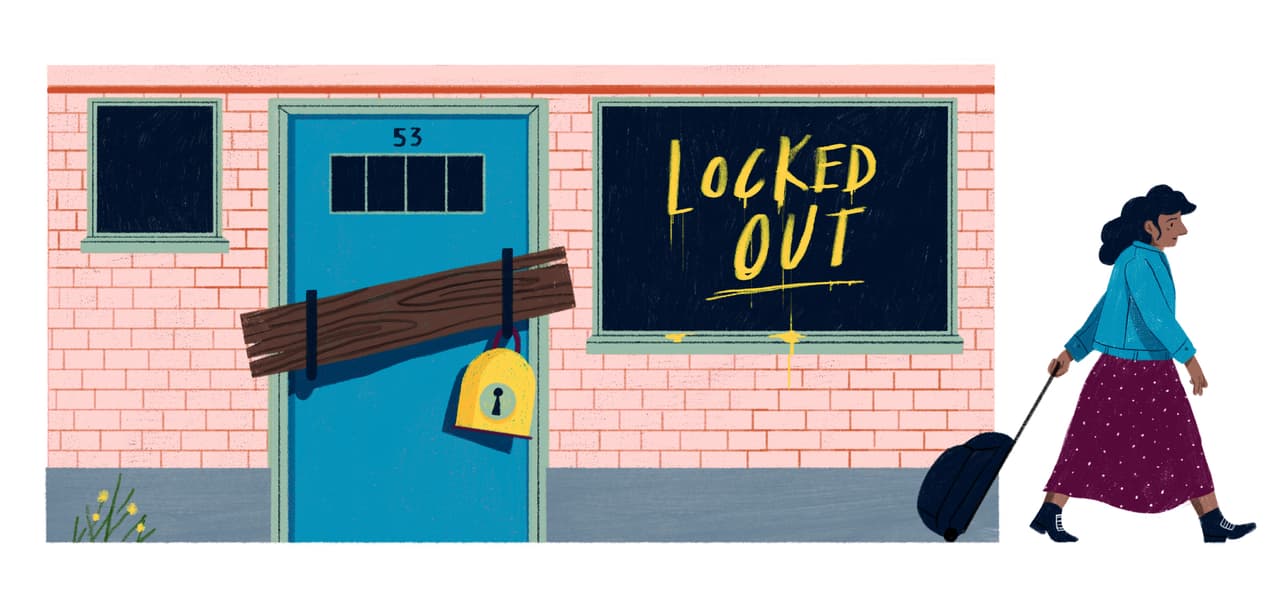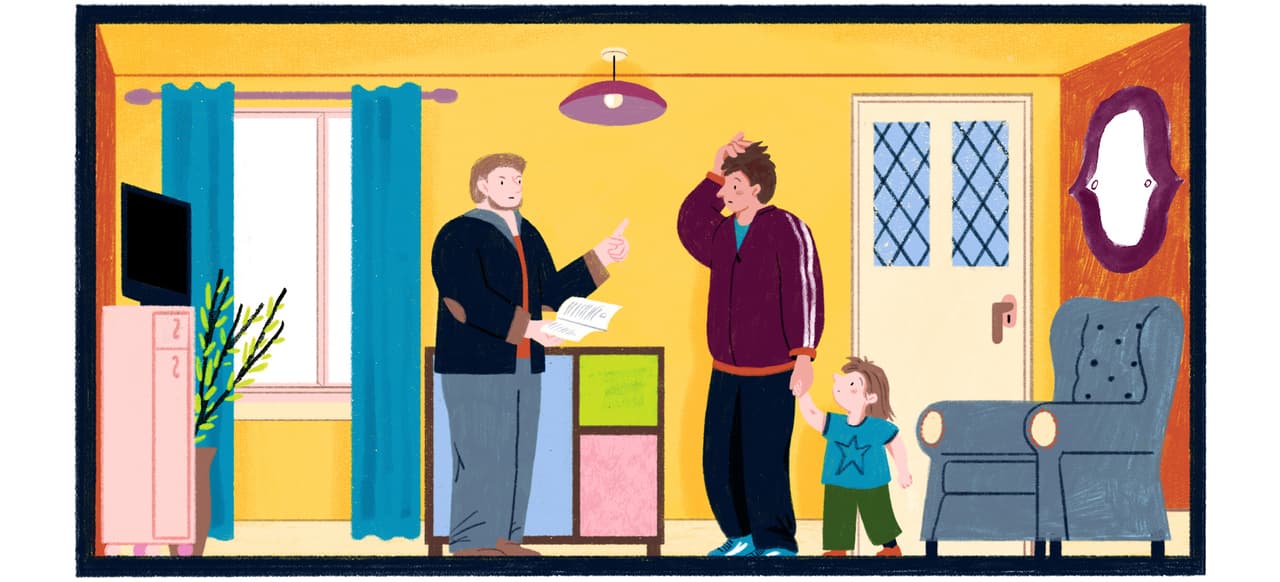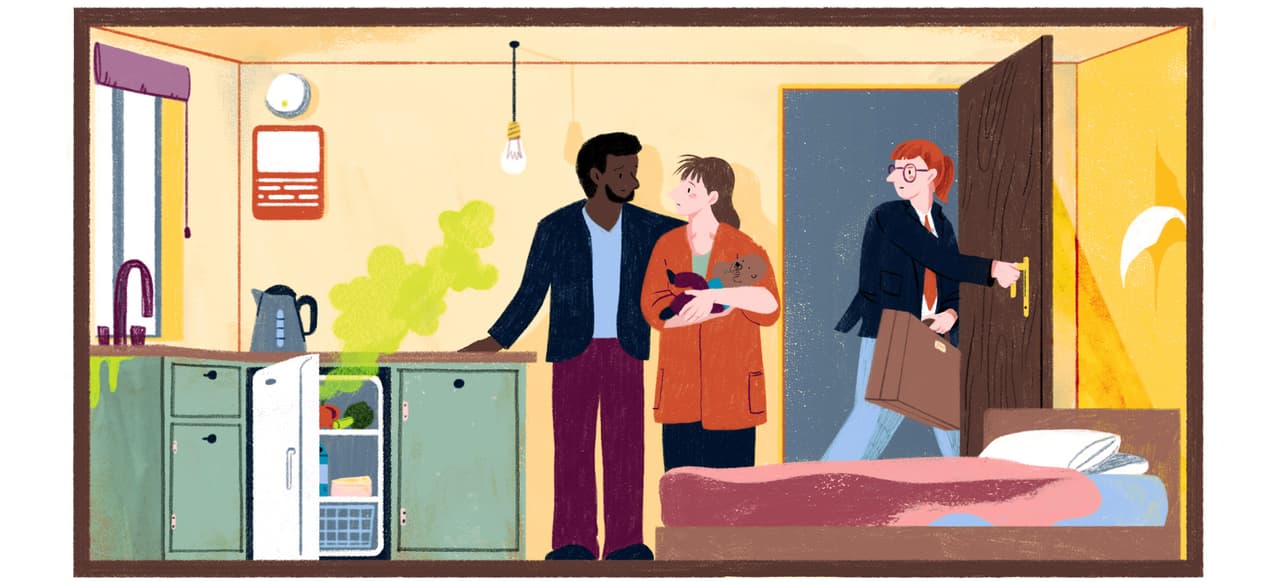
Locked Out: How Britain keeps people homeless
94% of rented homes are too expensive for families on housing benefit
Families on housing benefit are priced out of almost all homes to rent in Britain, according to new research by the Bureau of Investigative Journalism.
As part of our investigation into housing and new homelessness laws, the Bureau has found that councils have been increasingly encouraging those facing or experiencing homelessness to try renting privately, rather than wait for a council house.
However, only 1 in 20 of two-bed properties in the research were affordable. In some cities, the Bureau found almost no affordable two-bed flats to rent: York had seven, Bristol three, and Cardiff two. Moreover, even the affordable homes are often out of reach, because most landlords won’t let to benefit claimants – as the Bureau found when reporters contacted almost 200 landlords across Britain.
The local housing allowance (LHA) was frozen as part of the government’s austerity policy in 2016. The allowance, which varies from region to region, was supposed to cover the cheapest 30% of the local rental market. However, since the freeze rents have kept rising.
In a new and extensive piece of research, the Bureau captured the details of more than 62,000 two-bed rental properties across England, Wales and Scotland that were advertised on a single day. By mapping these against the LHA rates in each area, we found just 5.6% are actually affordable on benefits.
When the Bureau investigated the advice people were being given to avoid homelessness, we found many councils were simply giving vulnerable people lists of property rental websites.
Read the second part of our Locked Out investigation into how the government's new law to halve homelessness is failing vulnerable people
Find out moreResponding to the Bureau’s work, Jeremy Corbyn said: “The results of this investigation are shocking, but sadly not surprising.
“The number of people who are living — and even dying — on our streets is truly disgraceful. More than a million families are stuck on waiting lists for social housing, with many parents bringing up their children in totally unfit accommodation in the private rented sector, priced out by sky-high rents and living with no security about their futures.”
A huge number of cities and towns had barely any two-bed properties that would be affordable on housing benefit; more than 100 areas had ten or fewer.
In Bristol, a city of half a million people, just 3 of 450 properties were affordable, while in Ipswich, not a single two-bed flat was available.
The situation is dire in capital cities. Cardiff had only two properties that were affordable, out of 391 that were advertised. Last year more than 4,000 people asked Cardiff council for homelessness support. In Edinburgh, there were 12 flats out of 662 that a person on benefits could afford. In Central London, which has one of the highest rates of LHA at £320 a week, out of more than 4,400 two-bed homes advertised as for rent, only seven were affordable.
Across the country, people are regularly having to rent more expensive homes and top up their housing benefit with other funds to cover the shortfall. Our analysis found that the average British council would need their benefit allowance to be raised by £100 each month to make the cheapest 30% of the two-bed properties we sampled affordable. But in some areas that was much higher – in Central London, claimants would need an extra £1,422 a month.
The shortage of affordable housing leaves families struggling to get a roof over their heads. Ruth and her two sons had to leave their old flat after prolonged campaign of harassment by a neighbour, and went to Leicester council asking for help. They were advised to try to rent privately. She started calling landlords.
But when the Bureau looked in Leicester, just 10 of the 663 properties advertised would be affordable on housing benefit.
Ruth told the Bureau: “I tried for months and months and months, none of them would take us. I didn’t even get to viewing stage because I’d always ask if they took people on benefits and they all said no. Some said maybe if you can pay six months rent upfront but if I could do that, then I wouldn’t need benefits would I?! I must have tried over 100 properties.”
Refusal to let to those on benefits makes the shortage of affordable properties even worse. Reporters from the Bureau contacted the landlords of 180 two-bed properties that would have been affordable on housing benefits. In each case the reporter claimed to be a single mother with an 8-year-old daughter.
Half of those landlords said definitively that they would not let to anyone on benefits. Of those that were left, most said they would consider letting to our hypothetical family, but only if they could fulfil further conditions, such as paying six months’ rent in advance or providing a guarantor. One property site asked for a week’s rent in advance to even talk to the landlord.

While many of the landlords only refused to let when contacted in person, some are more blatant in their bias against tenants on benefits. The Bureau analysed the text of some of the advertisements and found 80 that explicitly stated “No pets. No DSS [a slang term for benefits claimants]” or “no housing benefit”.
Jon Sparkes, the chief executive of Crisis, told the Bureau: “We should all have a safe and secure home. This investigation paints a clear picture that for the overwhelming majority, we're not meeting this basic human need. This is simply unacceptable – we can and must do better.”
Leilani Farha, the UN special rapporteur on the right to housing, responded to the Bureau's findings, saying: “What is clear is that there is a systematic disregard for the human rights of those most in need.
“It’s shocking that so many landlords would simply deny access to housing based on the applicant’s source of income. That’s blatant discrimination and is unacceptable.”
Refusal after refusal means that Ruth and her boys are living in a small caravan on a friend’s driveway. The family had to give up their pets when they moved in, and Ruth’s 11-year-old son, who has autism, is feeling the loss of his cats. They have been in the caravan for two months and Ruth is not sure what will come next. “I’m doing what the council tells me but it isn't getting me anywhere.”
Leicester council said "As we have not been provided with Ruth’s full name, we are not able to confirm that she approached us, and have no available background to draw on. More generally, we can confirm that we offer a range of support for people who are faced with homelessness.
"We are constantly reviewing how best we are able to support residents in the private rented sector and we would encourage anyone in housing need to contact us so that we can help."
The rollout of Universal Credit has affected landlords’ confidence in taking on tenants on housing benefit. A study by the Residential Landlords Association found that more than half of private landlords who let to tenants on Universal Credit saw them fall into arrears.
A Bournemouth charity worker, who regularly sees people who are homeless struggling to rent, said: “There are only a handful of landlords round here willing to rent to people on housing benefits. With the university growing so much here that has driven the shared house and bedsit prices up, but I think it is less an affordability thing than discrimination.” The Bureau found just six affordable two-bed homes out of more than 600 in Bournemouth.
As well as working with the homeless, the charity worker is a private landlord himself. But a bad experience with a tenant on housing benefits has put him off letting to anyone else. “So I do understand why [landlords are reticent], but I appreciate that is tarring everyone with the same brush.”
In London, Aye, 59, is also struggling to find a landlord who will let to him while he is on benefits. He lost his last home when he returned to Nigeria for his father’s funeral and fell into rent arrears.
When the Bureau searched for two-bed properties in Aye’s area, just 1.8% would have been affordable on LHA. We tried contacting 39 affordable properties across London, but not a single one agreed to rent to someone on benefits.
“I tried to look for somewhere to rent myself but the landlords don’t accept people on benefits. You know in their mind they are thinking, ‘Is this guy from the streets?’ I tried a lot,” he said.
Aye is staying in a bedsit while Southwark council tries to find him a more permanent place to stay. Although the LHA is frozen, councils regularly pay landlords directly to encourage them to let to tenants on benefits; Southwark spent £772,576 on these cash incentives last year, according to documents released under Freedom of Information laws, including paying one landlord £4,100.
Despite this, experts say only a small number of landlords are willing to work with councils. When properties do become available, Aye says he finds himself in competition with up to 20 other prospective tenants sent by neighbouring councils, some of which will attempt to outbid the others.
He said: “Some of the places they sent me to - you wouldn’t put your dog in there! And then they fill them with people who were sleeping rough who you know have problems, might be drunk or on drugs. I told them I don’t feel safe!”

Aye told the Bureau he wanted to find a permanent place soon so he could get a job. He used to work in administration for construction companies. “We helped to build Canary Wharf,” he said, smiling proudly.
In 2017 the National Audit Office noted that “changes to LHA are likely to have contributed to the affordability of tenancies for those on benefits and are an element of the increase in homelessness.”
A three-year investment to restore the rates of Local Housing Allowance to give people access to the cheapest 30% of the market would prevent about 8,000 households becoming homeless by 2025, according to research by Crisis and Alma Economics.
Campaigners hope the freeze on housing benefits will be addressed next year, but there was no mention of housing benefits in the government’s latest Spending Review. In the meantime, the Department for Work and Pensions has paid out £153 million to top-up funds that councils can use to make up the shortfall between some people’s benefits and rent, and has increased the budget going forward, a move campaigners say proves the current system is not working.
Polly Neate, the head of Shelter, said the freeze had been “truly disastrous”.
“People up and down the country are having to make impossible decisions on whether to cut back on food for their family or heat their home just to make up the shortfall between their benefit and rent,” she said.
Jon Sparkes, of Crisis, echoed her concerns and added: “We can’t let individuals shoulder this burden simply because housing benefit hasn’t kept up with rising rents.” He and Neate both said that while building more social housing would help, the most immediate and effective way to tackle the issue was to restore housing benefit rates to ensure they covered at least the cheapest third of rents across the country in the next Budget.
A government spokeswoman said: “Providing quality and fair social housing is an absolute priority. The government increased more than 360 Local Housing Allowance rates this year, by targeting extra funding at low-income households. We’re investing over £9 billion in affordable housing and an additional £2 billion after 2022.”
With additional reporting from Alice Milliken and Bethan John
Concerned? What can you do?
Share our stories We are sharing a series of stories on this topic — please share these with people you know - via email, social media, or on a community forum! Join us by using hashtag #LockedOut and sign up to our newsletter to hear new stories as they come out
Get local knowledge Use our calculator to find out how many private rentals in your area are out of the reach of people on housing benefit.
Take your own action If you’re concerned about the results in your area, you can write directly to your MP to raise the issue. You can also sign up to Crisis's campaign to raise housing benefit rates here.
Tell your story If you’ve had direct experience in England of failing to get housing from your council, you still have until 15 October to submit evidence to the UK government consultation on the Homelessness Reduction Act.
If you’re 16-25 and worried about homelessness, the Centrepoint Helpline is open Monday to Friday from 9am to 5pm; call 0808 800 0661.
Join this investigation
Become part of the Bureau Local — our collaborative network of reporters and citizens — and tell stories that matter.
Find out moreIllustrations by Harry Woodgate
Our reporting on the housing crisis is part of our Bureau Local project, which has many funders. Our work on the housing crisis was supported by the Bertha Foundation. None of our funders have any influence over the Bureau’s editorial decisions or output.





